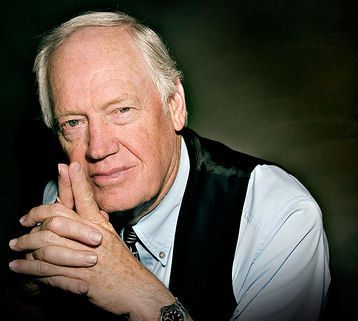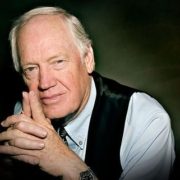RONNY COX – SONGS…WITH REPERCUSSIONS
ARTIST: RONNY COX
TITLE: SONGS…WITH REPERCUSSIONS
LABEL: WIND RIVER RECORDS
RELEASE DATE: 2009
 Expectations are high around here when Ronny Cox releases a new album. And fair disclosure is due: this reviewer named him among FolkWorks’ “Top Ten / Best of 2008” male singer-songwriters in L.A., two years after he earned “Listener Favorite” status on radio’s “Tied to the Tracks” for his original song, Sanctuary, about a newborn wild horse. And even before this review and another due this month in Dirty Linen magazine, Songs… with Repercussions was the number one album on the “Folk DJ” play list for the month of June, and Happy Father’s Day, a track on the album, was the number 4 song of the month.
Expectations are high around here when Ronny Cox releases a new album. And fair disclosure is due: this reviewer named him among FolkWorks’ “Top Ten / Best of 2008” male singer-songwriters in L.A., two years after he earned “Listener Favorite” status on radio’s “Tied to the Tracks” for his original song, Sanctuary, about a newborn wild horse. And even before this review and another due this month in Dirty Linen magazine, Songs… with Repercussions was the number one album on the “Folk DJ” play list for the month of June, and Happy Father’s Day, a track on the album, was the number 4 song of the month.
The phenomenon continued into the summer. In a new campaign called “Music in Art Theatres,” the Laemmle Theatre chain, in conjunction with (curiously enough) KCRW FM, the new Ronny Cox album was the focus for July. The album’s artwork was displayed on theatre screens, and a track played between the screenings of each film for the entire month, along with the distribution of 10,000 flyers on how to get the CD.
Let’s take a broad view, then get to the specifics of the new CD. In the past few years, a number of prominent actors have attempted to emerge as musicians, including Kevin Bacon and Kevin Kostner. But a few actors have a long established presence with their music, and Ronny Cox holds a prominent place.
In fact, he has quite a résumé as a folk musician. He played the guitar part of Dueling Banjos on-screen in the film, Deliverance. He was Woody Guthrie’s musical sidekick in Bound for Glory. (Woody was played in that film by the late David Carradine, and Ronny’s recollections are shared in the Somewhere Out There column in this edition.) Ronny has performed annually for years at the Kerrville Folk Festival, and around the circuit. He’s played on “The Tonight Show” with Jay Leno. He’s been featured on NPR’s “Mountain Stage” and “E-Town” (big-deal nationally-syndicated music shows we can’t get in L.A.), and he’s played plenty of venues in places around the world.
Ronny Cox has recorded five previous albums of mostly-original material, as far back as 1993, plus his 2007 tribute album to the songs of the late Mickey Newbury, a project produced by Jack Williams. Each time, Ronny has carefully selected musicians to back him. And let’s be clear: they are backing him. It’s always his music, done his way, lest you think he is just some celebrity who tells a producer to hire people to make him sound good.
Ronny does sound good, both as a vocalist and guitarist, his songs are substantial, and catching one of his live performances proves all that. Coupled with his considerable prowess as renowned character actor, his engaging on-stage banter and storytelling illuminate his songs far better than most. That’s true whether he is telling a tale in a Southwestern folk song inspired by real life – some dating to his rural New Mexico upbringing – or performing an original crafted wholly from his own imagination.
While his live shows elicit plenty of smiles and laughter between the songs and stories that make you misty, and Ronny is, himself, most often smiling, this new album is different.
From the portrait on the cover, it’s clear the tone this time is inclusive of the reflective and contemplative. Ronny’s liner notes begin with an acknowledgement that the album “is more than anything else, about the absence of Mary.”
Mary and Ronny were childhood sweethearts who married, raised a family and shared their lives until her death at the end of 2006.
Whether or not you know that going in, is the album a mournful affair? No. It is rather quiet, characterized by tight and somewhat sparse, always precise, arrangements. But so are many celebrated western and roots albums. There are some toe-tappers, splendid arrangements and plaintive harmonies here, including a passage where vocals become a haunting wind to close one track (Forever Ride). There’s a good balance of songs, both thematically and instrumentally. Tracks with strings are interspersed with those where piano is the featured instrument. And as the album notes observe, Ronny recorded it in South Carolina, with musicians who contributed their Southeastern and Southern roots music sensibilities.
Ronny does all the lead vocals and plays guitar; Danny Harlow plays mandolin and tenor guitar and contributes backing vocals; Susan Taylor plays guitar and banjo, sings backing vocals, and is one of the two pianists on the album; Cary Taylor plays bass, nylon string guitar, and harmonica, and sings backing vocals; Robert Bowlin plays violin, gypsy guitar, and is the other pianist; Tom Roady plays percussion; Wayne Manning does bass vocals.
Discussing the musicians and their instruments ahead of the songs helps to understand the character of this record. Only three of Ronny’s originals are included, each quite different from the others, and each shares a co-write credit with a different collaborator.
Let’s look at the album’s 15 songs, track-by-track.
The opener is a cover of the J. Fred Knobloch / Darden Smith song, Can I Come Back Home, an upbeat ditty that any lover of old-time music will find delightful. Following is the old classic, The Water Is Wide, where the production of each instrument is superb; there are nice short solos around Ronny’s lead vocal, wherein you hear a lot of what he’s feeling. Next is Grapes on the Vine, a co-write by Steve Gillette and Charles John Quarto, and the banjo and mandolin here are an auditory dance with the backing harmonies; Ronny has a bit of the young Kristofferson in this lead vocal.
Hugh MacDonald wrote the Aussie ballad The Diamantina Drover, a song we would call a classic of the lonesome cowboy life; Ronny will get plenty of requests to play it live, based on the album track. His friend and past producer, the folksinger-songwriter Jack Williams, wrote Give it to the Rich Man, and Ronny’s delivery of the Woody Guthrie/Pete Seeger-style social commentary lyrics follow a good arrangement that mixes precise mandolin textures with a bit of shooby-do backing vocals, making it fun to spin. A Horse Called Music, by Wayne Carson, could earn Ronny a spot on the Western Music Charts, delivered with sincerity and no fake twang.
Grady is the first of Ronny’s originals on the album, a co-write with Allen Shamblin. This is one of those songs that nobody does better than Ronny Cox. It’s a complete story, including a conflict, a resolution and a surprise, and a message that fits quite naturally.
Jonathan Byrd’s Happy Father’s Day is one of those songs that radio people salt away to play on the holiday the song portrays. This one deserves better than that, as one that can make you think about your dad, and Ronny does it justice.
Fans of Riders in the Sky will know the song written by that group’s founding member, Woody Paul, Compadres in the Old Sierra Madres. Ronny and his crew give it a Djangostyle treatment that works beautifully.
A real joy is the inclusion of The Better Man, written by Eric Schwartz, who is widely known for his satirical and politico-comedic songs. Having heard, separately, both Eric and Ronny play it live, there’s no question that this is the definitive recording, with one of Ronny’s best vocals and a bit of church choir harmony and piano that fits perfectly.
Santa Ana Winds is another of Ronny’s originals, and a co-write with Wayne Carson. Wait’ll the Western Music Association gets a hold of this one; everyone there will not only want to hear it, but to learn to play it.
Down the Trail to San Antone, by Deuce Spriggens, is done in the Bob Wills revival style of Hot Club of Cowtown, with Ronny’s own personal touches. Really fun, it’s another one that people will learn and sing along.
Peter John Mayer’s Holy Now is a great song, one that is ostensibly Christian, but immediately transcends that genre into the universally uplifting. The arrangement is a delight, including the nicely restrained drums, and Ronny’s vocal is central. Play it when you feel disconnected and it’ll fix you right up.
The album’s final Ronny Cox original is a co-write with J. Stewart, a clever charmer called Milkbone Underwear. The idea is a dog-eat-dog world in which you’re the one wearing, uh, yep…
The closer is a Wendy Waldman co-write with Bill Miller and Brad Parker, Forever Ride. It sounds as if they wrote it just for Ronny Cox.
Songs…with Repercussions does something interesting with the packaging, and it makes sense. The lyrics are included only for Ronny’s three originals, though you’re told you can go to his website to find all the song lyrics.
It’s attractively packaged, and no one should allow themselves to be turned-away by the black-and-white cover photo of the contemplative Ronny Cox. Inside, the music and the package are filled with colors, mostly from the end of the big Crayola box that isn’t visited often enough. If you need raucous head-bobbing, go elsewhere. If you’re looking for a record with tasteful instruments you can actually hear, vocals that quietly speak volumes, and splendid natural mixes and production, you’ll thoroughly enjoy this, over and over.
You can read Larry’s Acoustic Americana Music Guide with its extensive descriptions of upcoming folk-Americana and acoustic renaissance performances, and its companion, the Acoustic Americana Music News; both are updated frequently at http://acousticamericana.blogspot.com. He contributes regularly to No Depression, at http://community.nodepression.com/profile/TiedtotheTracks. His acoustic Americana radio show, “Tied to the Tracks,” enters national syndication this summer. Contact Larry at tiedtothetracks@hotmail.com.













